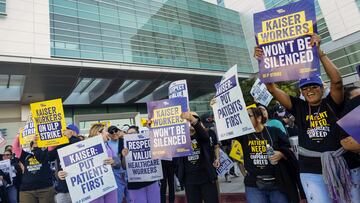Do Kaiser Permanente clients still have to pay membership fees during the workers strike?
Thousands of Kaiser Permanente workers are on strike for better pay and conditions. What happens to membership fees during a strike?

The country’s largest healthcare worker strike began on Wednesday as 75,000 Kaiser Permanente workers walked off the job. The strike takes place after the insurance giant refused to meet union demands and reach an agreement after the worker’s contract expired on 30 September. The vast majority of workers on strike, 68,475, are Kaiser employees in California, where the healthcare giant is the state’s largest insurer.
The strike began on 4 October and will end on 7 October, with workers from five states and the District of Colombia participating. The Coalition of Kaiser Permanente Unions stated that the strike intends to show company bosses that workers are critical to their operations and that they “will not stand for their unfair labor practices.” The unions have warned that if the company continues to negotiate in bad faith, a more prolonged strike will come in November.
Members will continue to pay throughout the strike.
During the three-day strike, membership dues will be collected as they normally are, meaning that the revenue streams for the company remain intact.
Kaiser, which operates as a non-profit with a 501(c)3 status, functions differently from many other healthcare companies in that members pay dues to receive access to care; employers may pay these fees on behalf of their workers. During the first two quarters of 2023, Kaiser reported an operating income of $3.3 billion. In 2021, according to ProPublica, Kaiser Permanente, which as a non-profit is not required to pay taxes, spent $85.2 million on pay for executives, who make up 0.1 percent of the company’s 213,000 workers. Workers are asking for pay increases of 6.5 percent for the first two years of the contract and 5.75 percent for the last two, to which the company has responded with an offer of around half that.
How will the strike impact care for members?
While the short strike may cause disruptions for members, the workers participating in the historic labor action argue that it is necessary to protect members from the degradation of care they have witnessed over the last few years. A major concern for many Kaiser workers is the use of outsourced temporary workers and staffing levels that stretch medical teams thin when it comes to providing patient care.
Kaiser told KQED, the San Fransisco-Bay Area outlet, that doctors and nurses would not be on strike. However, the company has scaled back its non-emergency and elective medical services because many of the support staff needed to carry out this work are on strike. For instance, while doctors may report to work, many lab technicians who run tests (i.e., blood, urine, imagining, etc.) are on strike, creating a backlog that could pile up quickly. Additionally, with thousands of administrative support staff on strike, members will likely notice additional delays as many of these workers are the organization’s backbone that allows medical professionals to do their jobs. From scheduling appointments to checking in patients when they visit a medical office or hospital to billing and much more, the administrative staff is critical to the operational organization of the company, and many feel that their work has been overlooked for too long.
Kaiser leaders told CNN that while a full contract has not been finalized, tentative agreements have been reached on some key issues. Negotiations are expected to continue this month, with the threat of a larger strike from the unions looming.






